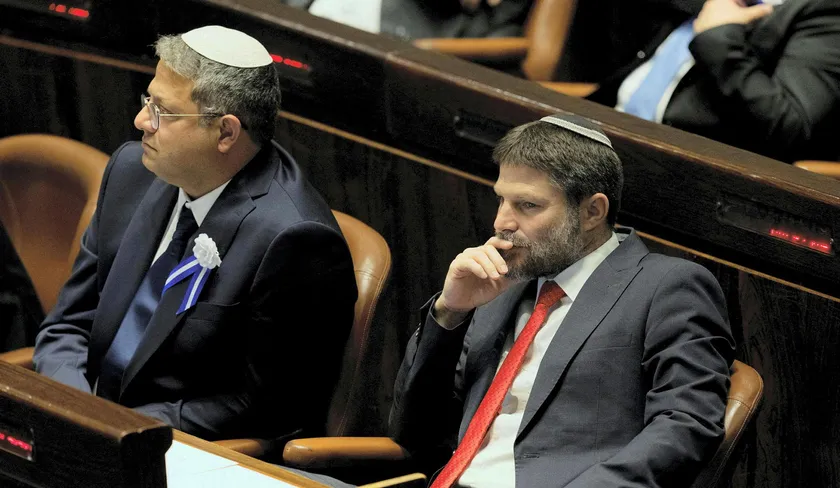King Abdullah of Jordan greeted the new Israeli government with a warning this week. “We have certain red lines,” he said in an interview with CNN. “And if people want to push those red lines, then we’ll deal with that.”
The government has already crossed one of these red lines. Its coalition guidelines say “the Jewish people has exclusive and unassailable rights to the entire Land of Israel. The government will promote and develop settlement in all parts of the Land of Israel – the Galilee, the Negev, the Golan, Judea and Samaria [West Bank].”
In an exclusive interview, @KingAbdullahII says Jordan is willing to work with "anybody and everybody" in Israel to bring peace, but won't allow his “red lines” over Jerusalem to be crossed. He told me why he's keen to preserve and develop Christian holy sites in the Kingdom. pic.twitter.com/Y8i3jnR6gL
— Becky Anderson (@BeckyCNN) December 28, 2022
This “right” has admittedly been included in previous governments’ guidelines, but that it is “exclusive and unassailable” is new. Combined with the fact that there’s no mention of any intent to reach a peace agreement with the Palestinians, it creates a diplomatic front not only against the Palestinians and Jordan, but also against the U.S. and other Western countries.
But Abdullah is less concerned by the statement itself than by its implementation and effects. That’s what will bring him closer to the moment when he has to address the key issue of his responsibility for Muslim holy sites in Jerusalem, which he sees as his and his kingdom’s “unassailable” asset.
Can he count on his friend, U.S. President Joe Biden, to thwart Prime Minister Benjamin Netanyahu’s ambitions, and especially those of his ministers from the nationalist far right, Itamar Ben-Gvir and Bezalel Smotrich, who seek to build the Third Temple? Can he rely on the empty pact known as “Arab unity,” especially when there’s growing talk of normalization between Israel and Saudi Arabia, which hasn’t concealed its desire to take Jerusalem’s holy sites under its own wing and oust the Jordanian king from them?
And no less important, can Abdullah deal with the public protests that may well erupt in Jordan and could drag large swaths of the public in other Arab and Muslim countries in their wake?
The last time Netanyahu said he would apply Israeli law to the West Bank, it was an Arab country, the United Arab Emirates, that offered a particularly tempting reward for taking that threat off the table – peace and normalization with Israel.
The rapidity and extent to which bilateral relations have developed since then and the warm peace that has been created (in contrast to the chilly relationships with Egypt and Jordan) could ensure that Abu Dhabi shows maximum flexibility toward Netanyahu’s policies in the West Bank and Gaza Strip.
In recent years, the UAE has developed an independent foreign policy that isn’t tied to that of other Arab countries or even other Gulf states. It maintains diplomatic relations with Iran, renewed relations with Turkey, abandoned the Saudi coalition in Yemen’s civil war and is flirting with Russia and China even as it considers itself a U.S. ally.
Peace provided it leverage to influence Israeli policy in the Middle East, but it has used this leverage sparingly. It would be hard for Abu Dhabi to threaten to violate or withdraw from the peace treaty in the name of solidarity with the Palestinians.
Meanwhile, Egypt under President Abdel-Fattah al-Sissi has developed a relationship with Israel that could be termed an unofficial strategic alliance. It’s based on a deep recognition of their mutual security interests.
This relationship doesn’t consist merely of intelligence cooperation or Israel’s consent to Egyptian military operations in areas that were supposed to remain demilitarized under the Camp David Accords or even Israel’s permission to change the status of the Red Sea islands of Sanafir and Tiran. They’re just the fruits of the diplomatic and military infrastructure created together with Israel’s strategy of turning Gaza into an obstacle to any diplomatic process with the Palestinians by disconnecting it from the West Bank.
Egypt, for its part, has informally recognized that the two-state solution isn’t realistic for the foreseeable future. Consequently, it considers it vital to neutralize the security threat that could develop in Gaza and spill over into its own territory. But the current coincidence of Israeli and Egyptian interests depends on the intertwined relationships between Gaza, the West Bank and Jerusalem.
Hamas and Islamic Jihad have made a “united front” between the West Bank and Gaza a foundation of their strategy of resisting the occupation and are thereby trying to undermine Israel’s effort to deal with each territory separately.
But in reality, Hamas in Gaza is bound by agreements with Egypt, and indirectly with Israel as well, and it benefits from a flow of Qatari cash and reconstruction projects carried out by Egypt. In contrast, the West Bank has become a free-fire zone where Israel is conducting many operations, mainly against Islamic Jihad and localized cells.
But changing the status quo on the Temple Mount, accelerated settlement activity in East Jerusalem or a serious worsening of prison conditions for Palestinians jailed in Israel would suffice to end this separation. Such changes could reignite Hamas military operations in Gaza and thereby threaten Egypt’s domestic front.
Given that the future of Qatar’s aid to Gaza isn’t guaranteed, and neither is the extent of the relief Israel will give Gaza now that Smotrich is the minister in charge of the Coordinator of Government Activities in the Territories, the areas of friction could expand. Egypt might then discover that the rules of the horse-trading it has conducted with Netanyahu for years have been changed by the introduction of a new Israeli player who doesn’t recognize them.
Netanyahu will then be required to prove that the understandings with Egypt remain in effect and that the commitments that Israel took upon itself are not subject to Smotrich’s whims.
But this doesn’t only involve the Israeli-Egyptian axis. The stability of this constellation of relations is also dependent upon Netanyahu’s desire to bring about a normalization of relations with Saudi Arabia, which isn’t only a strategic ally of the Egyptians. The Saudis also provide Egypt with a considerable portion of the economic oxygen that it requires to survive.
The development of a protest movement in Egypt in reaction to Israeli policy in the West Bank, Jerusalem and Gaza is prompting disquiet in Saudi Arabia. Are the Saudis expected to embrace Netanyahu is exchange for “proper” conduct in Gaza and the West Bank? Unlike the UAE, Saudi Arabia hasn’t acted to put a stop to Netanyahu’s intention to annex portions of the West Bank and hasn’t offered a peace agreement in exchange for a change in Israeli policy.
Yet the Saudis view themselves as a country with the power to dictate policy rather than one that simply hands out gifts. An example of that is the manner in which it has taken advantage of the war in Ukraine and the soaring price of oil to force President Biden to reconcile with Saudi Crown Prince Mohammed bin Salman, including a presidential visit to Saudi Arabia. But a short time later, Biden got a slap in the face when the Saudis refused to accede to his request to boost oil production.
Riyadh also flaunted its close ties with Russia when it refrained from going along with the international sanctions that have been imposed on Moscow. And recently the Saudis hosted Chinese President Xi Jinping with great pomp and signed a major series of cooperation agreements with him.
On the Palestinian issue, Saudi Arabia is the one that ordered the Arab Peace Initiative, which was aimed at normalization of relations between the Arab world and Israel, and it has taken pains to underscore that the plan is the primary basis for a solution to the Israeli-Palestinian conflict. The Saudis have made it a condition to establishing relations with Israel.
Military and technological cooperation between Saudi Arabia and Israel, Saudi Arabia’s agreement to permit Israeli planes to fly through Saudi airspace and meetings between senior officials of the two countries and the personal acquaintance between Crown Prince Mohammed and Netanyahu are part of unofficial negotiations that the two countries are conducting – in a payment on account of sorts.
But the path toward full normalization includes two high hurdles – a real improvement in relations between Riyadh and Washington and significant developments in the Israeli-Palestinian arena.
But Israel, which had been due to be the chaperone in a rapprochement between the Saudis and Americans, now itself needs to show support for the U.S. and demonstrate that the new Netanyahu government isn’t posing a challenge to the values that Biden is promoting around the world – and that it isn’t turning itself into a “pariah,” as Biden called the Saudis on the election campaign trail.
It’s also doubtful, in light of his tense relations with Crown Prince Mohammed, that Biden would agree to again embrace the Saudi leader even in exchange for a Saudi peace agreement with Israel.
When it comes to the Palestinian issue, Saudi Arabia isn’t in a hurry. It’s waiting to see how the Israeli government intends to implement its policy guidelines in the territories before issuing any kind of construction plans for a Saudi embassy in Israel.
The last thing the Saudis need is a public handshake with an Israeli prime minister against the backdrop of Israel air force planes bombing Gaza or bulldozers demolishing Palestinian villages in the Hebron area – or Jordanian protesters demanding a break in diplomatic relations with Israel.
As with Arab countries that have signed peace agreements with Israel, one cannot accuse the Saudis of profound solidarity with the Palestinians. But each of them has its own “private” reasons to be concerned about the prospect of a collapse of the status quo that has been established in recent years in the territories. It’s based on a balance of deterrence and interests that most of the time offset any desire for a violent uprising.
From the standpoint of the Arab countries, the importance of the status quo is that it excuses them from dealing with the Palestinian issue as long as it ensures that the situation won’t spill over into their own countries and arouse their own populations.
In their view, the new Israeli government has the real potential to shatter the existing order, and they can no longer count on Netanyahu’s capacity to fully control this explosive arena.
Granted that the Egyptian president, along with the Jordanian monarch and Saudi crown prince, make it clear that they can work with any Israeli prime minister and that the Israeli election results are a domestic Israeli matter, but they’re also consulting intensively among themselves to agree upon possible options in the face of the nightmare taking shape in Jerusalem.
Shortlink for this post: https://daysofpalestine.ps/?p=32516








